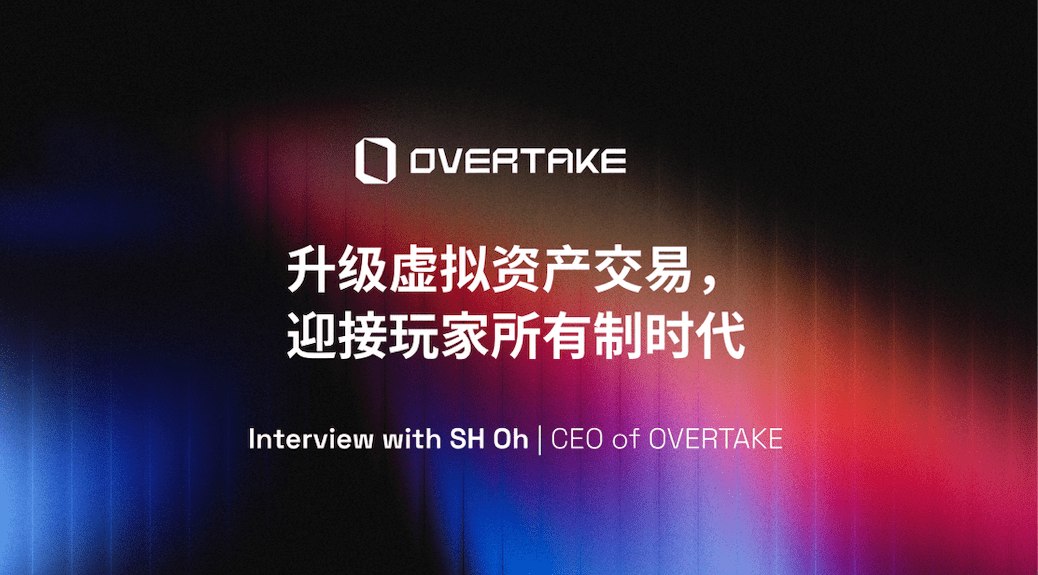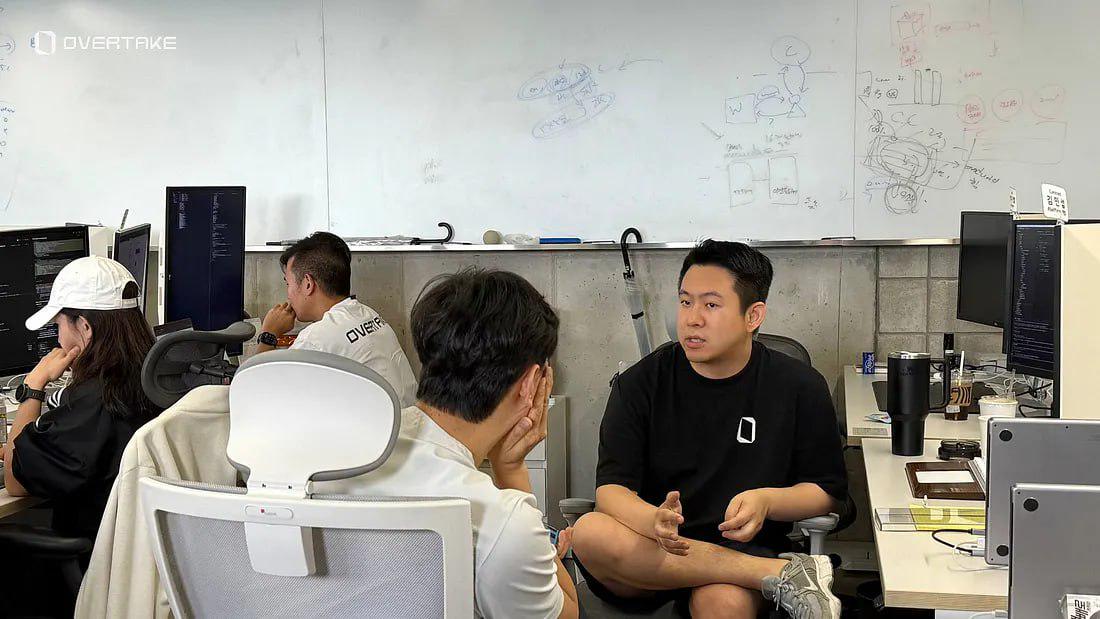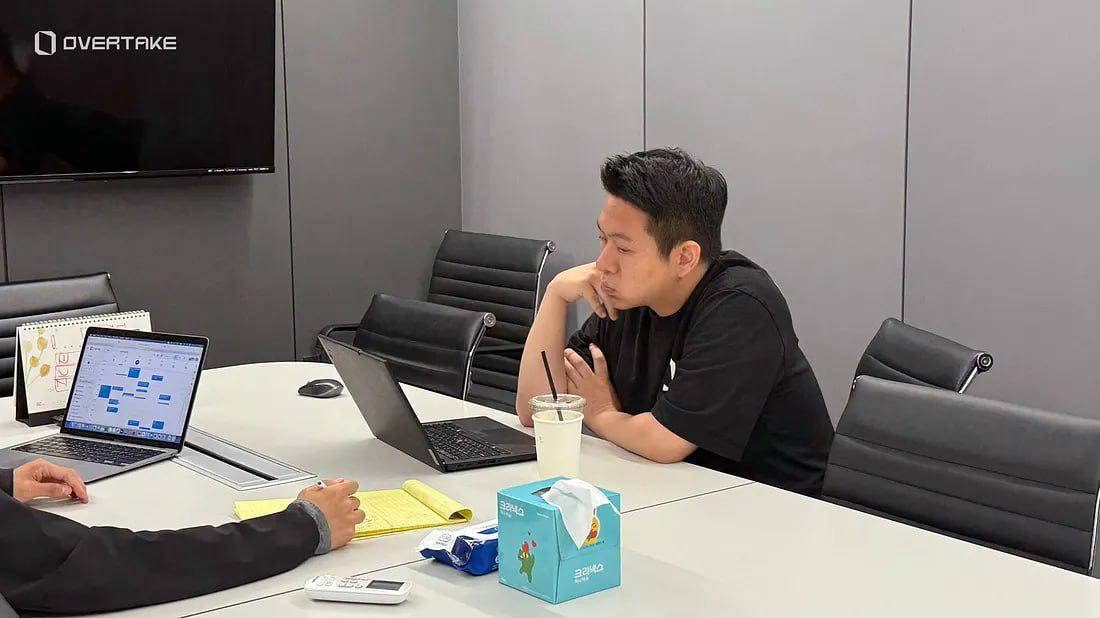After the noise and bubbles in the blockchain gaming space fade, how to build a business model that can both accommodate real trading needs and operate sustainably long-term has become a question that teams staying at the table must answer. The story of OVERTAKE was born from such a background: it does not rely on token incentives to 'pull in users,' nor does it stack concepts to gain popularity, but instead steadily shifts the verified demand for game asset trading that has already existed in the Web2 market onto the blockchain.
Founder SH was a passionate ladder player and has also developed growth strategies for tech giants at top consulting firms. Now, he leads a team of engineers and designers, trying to reshape the relationship between players and digital assets using on-chain ownership, smart custody, and seamless product experiences. In this migration from PvP to PvE, OVERTAKE aims not to be a temporary winner but to be the underlying infrastructure of future on-chain gaming business.
From passionate player to entrepreneurial captain, the birth of OVERTAKE.
BlockBeats: Many people are unfamiliar with your previous background. Can you talk about your transition from a 'hardcore gamer' to a Web3 entrepreneur?
SH: I have been a hardcore gamer since childhood, battling day and night on the ladder of (StarCraft), (Raid), and (World of Warcraft). After graduating from business school in Rotterdam, I joined Boston Consulting Group, providing growth strategy advice to tech companies. In my work, I continuously saw a problem—the digital value created within games had almost no connection to the distribution and settlement systems of the real world.
A prominent example is that large-scale peer-to-peer trading among players has existed for a long time, but true ownership and transparency are lacking, which puts players at significant risk and inefficiency in transactions. In 2023, I gathered a small team of engineers and designers to try to solve this problem—enabling players to fully own and freely trade the value they create. This idea ultimately gave birth to OVERTAKE, and it has been written into our vision and mission.
BlockBeats: Why is 'true ownership of digital items' a timely proposition worth betting on?
SH: In my view, this is not a trend of some niche subculture but a generational shift concerning digital fundamental rights. The secondary market for digital goods circulates tens of billions of dollars annually, with the gaming sector alone estimated at around $55 billion. However, most of this value still flows through fragmented, opaque, and unofficial channels.
When on-chain ownership is combined with smart custody mechanisms, the three major issues of trust, speed, and liquidity can be solved simultaneously. This not only changes the identity of players—they are no longer just 'users' but substantial economic owners, which we refer to as 'player-led economy'.
How to build a Web3 product that 'doesn't look like Web3'?
BlockBeats: If you had to explain OVERTAKE in one sentence, how would you say it?
SH: OVERTAKE is a peer-to-peer trading market based on Sui, providing security for game asset trading through smart contract custody.

BlockBeats: OVERTAKE was not initially a trading platform but started from game publishing. What made you decisively shift towards building market infrastructure?
SH: Our initial attempt was a combination model of 'game publishing + trading market'. However, early Web3 games often attracted profit-seeking reward hunters rather than long-term players, resulting in high user churn rates. We realized that if we could meet the existing and validated peer-to-peer trading needs with proper infrastructure, it would be a more sustainable path.
Thus, we rebuilt the backend system—covering smart custody, wallets, settlements, and risk management—and focused our energy on the core of trading. This pivot aligns closely with our vision—building infrastructure around real user behavior.
BlockBeats: ItemBay and ItemMania have been very successful in the Web2 virtual goods trading space. What prompted you to move this mechanism onto the blockchain?
SH: The Web2 peer-to-peer trading model in South Korea has been validated in terms of scale, user habits, and trust. By combining this with the transparency and programmable settlement of blockchain, we can structurally reduce costs, accelerate settlement speeds, and minimize fraud.
In other words, the user experience remains familiar—but at the underlying operation level, it becomes safer, more efficient, and lower cost.
BlockBeats: What designs for 'decentralized default' does OVERTAKE currently have in its product architecture? How do they help users transition naturally to Web3?
SH: Our goal is to achieve a form of 'quiet decentralization':
1. Seamless access: Starting with login via email or social accounts (zkLogin) → the backend automatically generates a wallet, and the platform sponsors gas fees.
2. Smart custody: Assets are locked and released by smart contracts, logs are transparent, requiring no human intervention.
3. Incremental on-chain integration: Gradually adding features like tokenization, verification, and custody in a modular way without disrupting user experience.
In this way, Web2 users can enjoy all the advantages of Web3—ownership, portability, and security—almost without feeling any resistance to use.

BlockBeats: Many Web3 projects rely on 'token incentives' for user growth, yet you managed to run transactions during closed testing without issuing tokens. How did you achieve this?
SH: Our closed test verified three core pillars without any token incentives: speed, low fees, and trust. Transactions can be settled instantly (for example, sellers can receive USDC immediately after the transaction is completed), transaction fees are significantly lower than typical Web2 marketplace platforms, and fraud risk is minimized through smart custody and reputation mechanisms. The conclusion is clear—users engage in transactions for practicality and experience, not for rewards.
BlockBeats: OVERTAKE has launched several 'friction reduction' product features—such as automatically generated wallets and supporting credit card purchases for game skins. What is the product philosophy behind these designs? How does your TakeShop store model align with this vision?
SH: Our philosophy is to provide sellers with secure on-chain stores that they control themselves, while not changing their original trading methods. Through TakeShop, anyone can set up a store in minutes without code, share the store link through any channel, and receive payments instantly using familiar payment methods—while wallet and gas fees are handled automatically in the background. This is the 'frictionless' Web3 experience: users can enjoy the advantages of Web3 without feeling complicated or burdened.
BlockBeats: Currently, your core focus is on on-chain trading of game items, but this market has also attracted regulatory attention multiple times due to issues like fraud and money laundering (including Steam banning skin trading arbitrage). Are you concerned that the platform will be required to bear more compliance costs due to true ownership?
SH: We are very aware of the risks involved—this is why we have integrated compliance mechanisms into the design from day one:
1. KYC, transaction monitoring, and sanctions list screening are built into the process.
2. A trading process based on smart custody, where everything from asset locking to settlement can be traced throughout the entire process.
3. Set cooling periods, limits, and review rules based on different games and regions to prevent abuse.
True ownership may increase regulatory requirements, but with transparent records and programmable controls, we can actually mitigate risks.
Can PvE really open the door to Web3 commercialization?
BlockBeats: You mentioned that Web3 is shifting from PvP to PvE. How do you define the 'PvE model'? What role does OVERTAKE play?
SH: In our definition, PvP is the recycling of value within the same closed user pool, essentially a zero-sum liquidity game; whereas PvE introduces new users and capital from the outside world through open value creation.
Stablecoins, RWA (real-world assets), and embedded crypto primitives have already proven how real-world problems can drive adoption. OVERTAKE is an application aligned with the PvE path—it embeds on-chain ownership and custody mechanisms into existing game trading needs, thus introducing new value and new users.
BlockBeats: The product roadmap of OVERTAKE includes modular output paths like SDK suites and Protocol-as-a-Service. Does this mean you are more like 'on-chain Steam' rather than 'on-chain Axie'? Why choose this B2B path?
SH: Yes, we have proven that the market can generate healthy trading activity without relying on initial token incentives—liquidity, trust, and low fees can drive real usage demand. Our token will be built on this foundation, linking rewards directly to trading activity and returning a portion of platform revenue to the community. Its design focuses on practicality—covering governance, fee discounts, and transaction-based incentives—ensuring that growth is always aligned with the long-term health of the ecosystem rather than chasing short-term speculation.

BlockBeats: Bringing mature Web2 demand onto the chain—you are not asking players to 'migrate to Web3' but instead taking the existing Web2 in-game asset market onto the chain while maintaining a familiar front-end experience. Why is this the right path? What does it mean for players and game studios?
SH: We adopt a practical approach rather than relying on jargon. Most transactions occur in Web2 scenarios; we are merely providing a better 'track' for them.
For players, there is no need to learn anything new: pay in familiar ways, complete custody settlements instantly, and enjoy lower fees and verifiable ownership—wallet and gas fees are handled automatically in the background.
For game studios, our SDK/protocol provides verified items, programmable royalties, and compliance tools, unlocking new revenue streams while retaining control.
Blockchain here is merely an implementation detail that brings security, auditability, and interoperability to behaviors that users already have.
BlockBeats: OVERTAKE emphasizes its strategic partnership with Sui. How does this make you a flagship project in gaming and on-chain business?
SH: Sui's high performance and object-based architecture enable fast, low-cost microtransactions and true asset ownership. Combined with Slush Wallet and zkLogin, players can log in directly with social accounts and start immediately without complex wallet setups. This seamless experience allows Web2 players to complete on-chain transactions almost without feeling it. Our deep integration with Sui makes OVERTAKE a flagship project in its ecosystem, showcasing how blockchain can empower mainstream gaming business.
